The Dead’s Long Strange Trip Says Fare Thee Well
by Best Classic Bands Contributors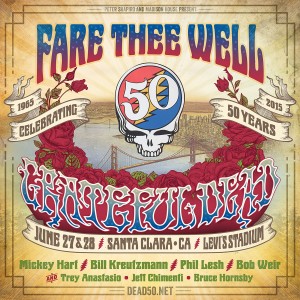 From now through the Fourth of July holiday weekend, The Grateful Dead will enjoy their greatest fame and media focus ever… 20 years after its titular leader and musical linchpin Jerry Garcia died and the group called it a day. As the classic rock band that most exemplified the spirit and various ethos of the 1960s counterculture, the group always operated outside of the mainstream even as they were filling arenas and stadiums. They created a community of fans and followers known as Deadheads who devotedly followed them from show to show and even a subset within it of the tape traders who recorded concerts (with the band’s approval and support) and swapped them. Decades before what’s today called Americana music started drawing on our nation’s musical roots, the Dead were mining gems from country, blues, folk, jug band and other styles and rendering them into Grateful Dead songs alongside their own original material. No other band went so far beyond being just a band to become both a state of mind and something of a lifestyle, as well as, at least for tie-dye fashions, style arbiters. And in a way avatars whose music, way of operating, relationship with fans and image all helped echo the hippie movement that the Dead helped found in San Francisco’s Haight Ashbury district well past its sell-by date.
From now through the Fourth of July holiday weekend, The Grateful Dead will enjoy their greatest fame and media focus ever… 20 years after its titular leader and musical linchpin Jerry Garcia died and the group called it a day. As the classic rock band that most exemplified the spirit and various ethos of the 1960s counterculture, the group always operated outside of the mainstream even as they were filling arenas and stadiums. They created a community of fans and followers known as Deadheads who devotedly followed them from show to show and even a subset within it of the tape traders who recorded concerts (with the band’s approval and support) and swapped them. Decades before what’s today called Americana music started drawing on our nation’s musical roots, the Dead were mining gems from country, blues, folk, jug band and other styles and rendering them into Grateful Dead songs alongside their own original material. No other band went so far beyond being just a band to become both a state of mind and something of a lifestyle, as well as, at least for tie-dye fashions, style arbiters. And in a way avatars whose music, way of operating, relationship with fans and image all helped echo the hippie movement that the Dead helped found in San Francisco’s Haight Ashbury district well past its sell-by date.
This weekend (6/27 & 28) at Levi’s Stadium in Santa Clara, CA and next (7/3-5) at Soldier Field in Chicago – where the group played their last shows in 1995 – surviving founders Bob Weir, Phil Lesh, Bill Kruetzmann and Mickey Hart will be joined by Trey Anastasio of Phish, Bruce Hornsby and Jeff Chimenti to reprise the music of the Grateful Dead. With the concerts being aired and streamed beyond the locales and a just-announced box set of the shows to follow, it’s the group’s biggest moment ever. The event has ginned up a bit of controversy – such as how tickets for longtime fans via the band’s organization for the first announced Chicago date were usurped by a Ticketmaster rush that sold-out in an hour – and griping among devotees that a band that didn’t just break up but fractured are playing together again for a “cash grab” and that it can’t be the Dead without Garcia. And it’s sad to think that the adventurism, spontaneity, senses of idealism and possibility and, yes, fun and even enlightenment that characterized the group may well be somewhat archaic here in the second decade of the 21st Century.
No matter, really, though one must respect the feelings of those who supported the band with a devotion unrivaled by any other musical act. Fare Thee Well is the Grateful Dead once again coming alive to stride into the history books with an event that celebrates their legacy for everyone. And no other band deserves it more for not just a long strange trip but one that was rutted with fatalities, failures, fiscal struggles and various vagaries and challenges through which the Dead kept on truckin’ for 30 years. To reflect on the occasion, Best Classic Bands offers the thoughts on what it all means from writers who have known and followed the band’s music.
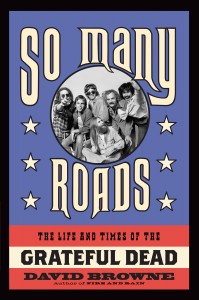 David Browne, author of the just-published book So Many Roads: The Life and Times of The Grateful Dead: It feels like something that had some financial motivations but also like it was something people wanted to see, and the band members realized that. When I first started working on the book in 2011, you kind of got the sense that communication among those guys was not so great, even though Weir and Lesh had Furthur at that point. I think there was some ill will after that 2009 tour they did that lingered for a while. There was no talk in 2011 that I heard about any reunion shows or how to commemorate the 50th. Maybe other people were talking about it on the business side; I didn’t hear anything about it.
David Browne, author of the just-published book So Many Roads: The Life and Times of The Grateful Dead: It feels like something that had some financial motivations but also like it was something people wanted to see, and the band members realized that. When I first started working on the book in 2011, you kind of got the sense that communication among those guys was not so great, even though Weir and Lesh had Furthur at that point. I think there was some ill will after that 2009 tour they did that lingered for a while. There was no talk in 2011 that I heard about any reunion shows or how to commemorate the 50th. Maybe other people were talking about it on the business side; I didn’t hear anything about it.
But as it got closer to that day, and now that we’ve seen the Stones celebrate their 50th and The Beach Boys, that number has taken on some significance. And you got the feeling that they couldn’t not do it.
A lot of people say it’s not the Dead without Jerry, and how can they do this? They have a point. But the other guys have been touring and playing those songs for 20 years. And the songs have really held up. Plus at this point hearing other people sing Jerry’s songs after 20 years, whether it’s Weir or Lesh or any of the other singers/guitar players they’ve worked with like Warren Haynes and John Kadlecik from Furthur and so forth, at this point I’m almost sort of used to hearing Jerry’s songs sung by other people with accompaniment by some other members of the band. It just seems at this point almost part of the story. By now we should all be used to that. If you want to hear those songs played live, someone else is going to have to play those leads. And Trey Anastasio seems like a totally natural choice for that. It feels kind of fresh because he’s jammed a little bit with some of those those guys but he hasn’t done a full show or tour like any of those other guys had. I think that brings an unknown but fresh quality to the Fare Thee Well shows, adds a little X factor that increases the interest in seeing that. There’s a little clip of him jamming with Lesh doing “Going Down the Road Feeling Bad” last month at Lesh’s club and it sounded pretty good. Trey takes a solo or two and it sounds like a little bit of him with a little bit of Jerry mixed in.
It’ll never be what it was, but I think at this point, 20 years after Jerry’s death, you have to pull back and say, look: This is one of the Great American Songbooks and these are the surviving people who can play it. And they picked other musicians who are tabbed into that vibe who can play and sing the songs really well. That’s about the best you can hope for at this point.
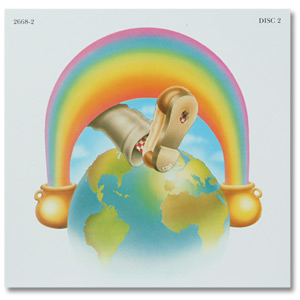 Early Deadhead, longtime music journalist and author and BCB contributor Jeff Tamarkin: For me, the Grateful Dead died on August 9, 1995, along with Jerry Garcia. But I’d already jumped “off the bus,” as Deadheads might put it, long before that, at the end of the 1970s. By that time I’d logged about 100 shows, starting at the Fillmore East in January of 1970, my enthusiasm never flagging after that till I suddenly decided I’d had enough and it was time to move on. The vast majority of the shows I’d seen had ranged from memorable to incredible; some were life-changing, others less than stellar. Admitting to myself that I no longer loved being part of that audience was difficult and often perplexing, but I knew it was the truth.
Early Deadhead, longtime music journalist and author and BCB contributor Jeff Tamarkin: For me, the Grateful Dead died on August 9, 1995, along with Jerry Garcia. But I’d already jumped “off the bus,” as Deadheads might put it, long before that, at the end of the 1970s. By that time I’d logged about 100 shows, starting at the Fillmore East in January of 1970, my enthusiasm never flagging after that till I suddenly decided I’d had enough and it was time to move on. The vast majority of the shows I’d seen had ranged from memorable to incredible; some were life-changing, others less than stellar. Admitting to myself that I no longer loved being part of that audience was difficult and often perplexing, but I knew it was the truth.
I do know one reason: By the end of that decade, I’d begun to sense that the GD scene itself was more important to many of the newer “Heads” than the music, and I felt alienated. For me it had always been more about what was happening onstage than the ritual, more than the tie-dyes and the swirly dancing and those little pieces of blotter paper. Going to Grateful Dead concerts was becoming less of a revelatory, celebratory experience; I’d been doing it out of habit, mostly for the hang with good friends. Then, at some point, I realized the music had steadily lost its spark for me; it’d become diluted, even slicker. As much as I wanted to think it so, the Grateful Dead of 1978 was not as exciting as the Grateful Dead of 1972.
I saw the band a handful of times after that and some of those shows were truly mediocre, although they were surprisingly fine when I caught them on their last East Coast swing in 1995, having been asked to go by a relative. By that time, though, I’d long since supplanted Dead concerts with a wider range of live music, from reggae to jazz, Americana to R&B to punk and other new rock. Much of my ability to enjoy that variety came directly from having been a Deadhead – they were, after all, a band that filtered massive amounts of musical information into their own presentation. They taught me to crave diversity.
So, no, I have no interest in Fare Thee Well. I hope everyone enjoyed themselves and the music rocked, I really do. But I’ll stick with my 5/2/70 Harpur College and Europe ’72 and my memories of the Capitol Theater and Winterland. Fare Thee Well, gentlemen. You truly helped define who I am.
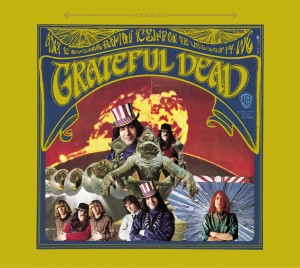 BCB Editor & former teenage hippie Rob Patterson: A friend made a $10 bet with me in college that I’d be a Deadhead by the time we graduated in 1975. I confidently shook on it. I’d already left my greatest love of of the Grateful Dead’s music behind back in the 1960s.
BCB Editor & former teenage hippie Rob Patterson: A friend made a $10 bet with me in college that I’d be a Deadhead by the time we graduated in 1975. I confidently shook on it. I’d already left my greatest love of of the Grateful Dead’s music behind back in the 1960s.
The self-titled debut Dead album – a rather rocking platter that still sounds way cool to my ears today; call it Acid Test party/dance music – was in steady Top 10 rotation for me and my teenage hippie crew back throughout 1967 and ’68. A couple of my pals played songs from it in their garage band. We loved it, were in a way somewhat founding Deadheads as for us they were at the core of the era’s countercultural music and consciousness. In the annals of Deadhead fandom to arise later, it’s hardly an essential album. For me, it’s still my favorite record of theirs.
Sure, I enjoyed how the Dead then began soaring into lysergic explorations in the two releases to follow, but they were already losing me to a voracious appetite for all other sorts of music, some of which they set me on the path towards. And then as now, ultimately, I love it best when the music rocks.
I couldn’t avoid the Dead in my 1971 to ’75 college years; it was almost like dealers gave you a free album of theirs with every lid of weed. My sophomore and junior year roommate Mike would come back from an 8 AM class three days a week, and one of the two albums he’d play with the first joint of the day in the living room as I awoke in the adjoining bedroom would be Europe ’72. It was very pleasant music to arise to (while the other album, 24 of Hank Williams’ Greatest Hits, was like awakening to a revelation from both heaven and the hell of loneliness and heartbreak), but overplay started to set in.
At the only Dead show I saw in ’73, I was so bored that it reminded me of the opening line of a review of Bob Weir’s solo album Ace – the release I still like most from the band’s creative salad days – by one of my favorite critics, Bud Scoppa (later to become a friend and peer), about how he (as memory serves me) half twiddled his thumbs and half nodded out through the one concert he saw by the band.
Even as I became enthralled with roots music, songwriting and harmonies in the early ’70s, I wasn’t as much of a fan of their quite popular Workingman’s Dead and American Beauty albums. It was likely an aftereffect of hearing the pristine harmonies of the first Crosby, Stills & Nash album the morning after my first acid trip. The Dead’s more loose and raw harmony singing sounded sloppy to me after such imprinting.
For years I loved telling the joke: What did the Deadhead say after the acid wore off? “Man, this band sucks.” Much as I knew they had much to offer.
Many Dead loyalists were horrified when they actually had a hit in 1987 with “A Touch of Grey.” But I dug the tune’s bouncy, hip-swaying groove and singalong chorus. Now that my own hair has more than a hint of my senior stature, it resonates even more.
By the dawn of the 1990s, the Dead felt so much part of the past in my musical world even if they were still active… until I heard the first track of the 1991 tribute album Deadicated: “Bertha” done by one of my favorite bands of the time (maybe ever), Los Lobos, and an affection for the Dead I knew two decades earlier was sparked.
Then a few years ago I listened again to the remastered Workingman’s Dead and American Beauty on Spotify and almost kicked myself for my earlier young man’s snobbery. They’re splendidly rich and engaging albums.
So for me, Fare Thee Well is less a goodbye than a needed reminder that I must return further to the Dead’s music and dig into the treasure trove of pleasures they offer – a pursuit I am sure will be rewarding. Like the LSD that’s a subtopic of this essay, they truly changed lives, rock music and popular culture.
Next up: Finally hearing the revered 1971 Harpur College concert – the school is now Binghamton University, but to us older townies as well as Deadheads it remains Harpur – that was the Holy Grail among Dead tape traders. And was where my older brother met his first wife. Both on acid. (It was fun to tell my very cool oldest nephew that fact when at age 17 he was hip enough to hear it.)
To me, Fare Thee Well, for all the many responses it may evoke from Dead fans, is a flashing neon sign reminder of how the Grateful Dead made so much truly classic (read timeless) music. Music that as much as I set it to the side for other sounds has proven itself inescapable. And I’d be a fool not to finally really open my ears, mind and heart to all their huge catalog offers before I say farewell.
As I post this on our site I’m listening to and digging on the 1972 Tivoli concert video embedded above. Guess I won’t be able to finally collect on that bet with all those years of interest after all.
Read our review of So Many Roads here.
- When the Climax Blues Band Got it Right - 05/21/2025
- Ever Wonder How Many Top 10 Singles Motown Had? - 05/13/2025
- Top 10 Bubblegum Hits - 12/30/2024


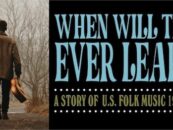
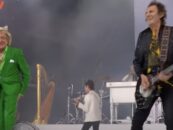
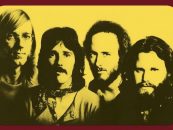
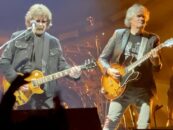

No Comments so far
Jump into a conversationNo Comments Yet!
You can be the one to start a conversation.